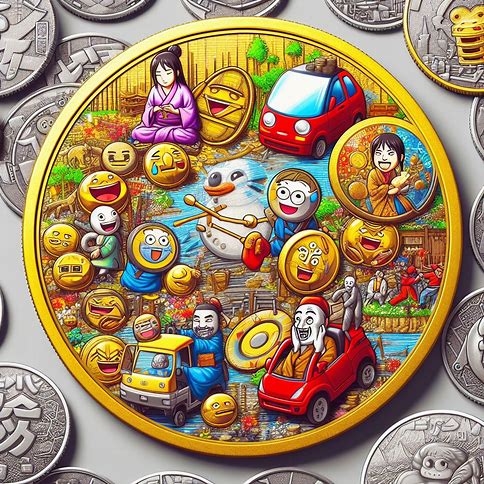For a newbie, cryptocurrency can feel like a language all its own when they come across the strange terms used by investors in the cryptosphere. If you’re new to crypto and keep coming across some words, phrases and acronyms you don’t know their meaning, then don’t worry. Here are 26 crypto slang terms you need to know.
1. HODL
Originally a typo for “hold,” HODL has become the battle cry for crypto enthusiasts who refuse to sell their coins, regardless of price spikes or drops. It’s not just a misspelled word; it’s a philosophy. HODLers believe in their cryptocurrencies’ long-term potential, often seeing dips as mere hiccups on the road to the moon (more on that later).
2. FOMO
The fear of missing out is real in crypto. When you see a coin skyrocketing and you’re not on that rocket, the regret can hit hard. FOMO drives a lot of impulsive investing decisions—sometimes for the better, sometimes for the worse. It shows that emotions play a huge part in the crypto trading game.
3. Shill
Have you ever seen someone relentlessly promote a specific crypto coin or project? That’s shilling. While it can be a genuine recommendation, often it’s someone trying to pump up the value of a coin they’re invested in. A word of caution: always do your research before following a shiller’s advice.
4. Moon/Mooning
When a crypto is on an upward trajectory, it’s said to be ‘going to the moon.’ It’s the dream scenario for investors—watching the value of their holdings skyrocket. But remember, what goes up can come down, so when you invest in a cryptocurrency, don’t get too lost in moon dreams.
5. Whale
In crypto-slang terms, whales are the big investors with enough coins to significantly influence the market. They can make waves with a single transaction. While you might never be a whale, understanding their impact on the market is crucial.
6. Bear/Bull Market
These terms are borrowed from traditional finance. A bear market is all about prices going down, signaling caution and sometimes pessimism. On the flip side, a bull market is when prices are charging upwards and optimism is in the air.
7. Pump and Dump
This shady maneuver involves artificially inflating the price of a coin (pump) before selling off large quantities (dump), which then causes the price to plummet. It’s a reminder that not all that glitters in the crypto world is gold.
8. Bagholder
This isn’t a term of endearment. A bagholder is someone left holding “bags” of a particular crypto after a crash who failed to sell on time, often bought at higher prices. It’s a sobering reminder that not every investment is a ticket to the moon.
9. FUD
FUD stands for Fear, uncertainty, and doubt, these three words sum up a strategy used by some to spread negative, often unfounded information about a crypto project or the market in general. FUD can sway market sentiment, so it’s important to separate facts from fear-mongering.
10. To the Moon!
A step beyond just’moon’ or’mooning,’ this phrase embodies the ultimate dream of every crypto investor: seeing their chosen coin’s value skyrocket to unimaginable highs. It’s a rallying cry for optimism and high hopes in the market.
11. Rekt
Short for ‘wrecked,’ this term is used when an investor suffers a massive loss, usually due to market downturns or bad trading decisions. It’s a stark reminder of the risks involved in the volatile cryptocurrency market.
12. No-Coiner
This term is for someone who owns no cryptocurrencies and is often used in a slightly mocking tone by those in the crypto community. It can also refer to skeptics who doubt the potential of cryptocurrencies.
13. Flippening
This term refers to a potential future event where Ethereum (or another altcoin) overtakes Bitcoin in terms of market capitalization.
Related: 63 Crypto, Web3 and Blockchain Terms You Need to Know
14. Diamond Hands
In contrast to those who panic sell, someone with ‘diamond hands’ holds onto their crypto investments through ups and downs, believing in their long-term value. It’s a term that symbolizes strength and resilience when the market is volatile.
15. Paper Hands
Opposite of diamond hands, this term describes investors who quickly sell off their crypto at the first sign of a price drop, often driven by fear of loss.
16. Weak Hands
Similar to ‘paper hands,’ this term refers to investors who lack confidence in their holdings and sell off their crypto at the first sign of trouble, often leading to regret if the market rebounds.
17. Shitcoin
Not all that glitters is gold in the crypto market. “Shitcoin” is a derogatory term for a cryptocurrency with little to no value or a dubious future. It’s a reminder to invest wisely and research thoroughly.
18. Rug Pull
This term describes a malicious maneuver in the DeFi industry where fraudulent developers quickly drain the funds from a project or liquidity pool, leaving investors with worthless tokens.
19. DYOR (Do Your Own Research)
This is a crucial piece of advice in the crypto community. DYOR reminds investors to not just rely on others’ opinions but to actively research and understand a project or investment before investing in it. Knowledge is power, especially in crypto.
20. FUDster/FUDder
A person who spreads FUD (fear, uncertainty, and doubt) Often, these individuals are seen as trying to manipulate market sentiment for their own benefit or out of mere skepticism.
21. Maximalist
This term is used for someone who is extremely bullish on a particular cryptocurrency, often to the exclusion of others. For example, a ‘Bitcoin maximalist’ believes that Bitcoin is the superior cryptocurrency and dismisses the value of altcoins. It’s a stance that speaks to loyalty and conviction in the cryptosphere.
22. Lambo
Short for Lamborghini, this term has become synonymous with the ultimate symbol of crypto wealth and success. “When Lambo?” is a half-joking, half-serious question about when one’s crypto investments will yield enough profit to afford this luxury car. It epitomizes the high aspirations and sometimes extravagant dreams of crypto investors.
23. BTFD (Buy the F***ing Dip)
A rallying cry among traders, this phrase suggests buying a cryptocurrency when its price has dropped significantly. It’s based on the belief that the market will rebound, turning a short-term loss into a long-term gain.
24. Moonshot
This term refers to a cryptocurrency that has the potential for a massive increase in value. It’s the lesser-known, often more speculative coins or tokens that could either bring huge rewards or significant risks.
25. Degens
A term referring to traders and investors who are frequently heavily investing in fishy, high-risk, high-reward crypto projects. These individuals often jump into emerging projects, seeking quick profits.
26. Golden Cross/Death Cross
These terms come from technical analysis. A ‘golden cross’ indicates a bullish market trend when a short-term moving average crosses above a long-term average. Conversely, a ‘death cross’ suggests a bearish trend when the short-term average goes below the long-term one.
Frequently Asked Questions
1. Why is it important to learn crypto slang?
Understanding common crypto terms can help you:
- Stay informed: Keep up with conversations within the crypto community and news articles.
- Make informed decisions: Avoid being misled by slang used in shilling or FUD spreading.
- Identify potential risks: Recognize terms like “rug pull” or “shitcoin” to be cautious of scams or risky investments.
2. Where can I learn more about cryptocurrency?
Many resources are available online and offline to learn more about cryptocurrency. Look for reputable websites, educational courses and communities focused on crypto education. Remember to DYOR (Do Your Own Research) before making any investment decisions.
3. Are there any terms I should avoid using?
While most slang is widely used, be mindful of the context and audience. Certain terms, like “FUD” or “shitcoin,” can be considered offensive or disrespectful in certain contexts.
4. How can I tell the difference between a genuine recommendation and someone shilling?
Be cautious of anyone overly promoting a specific coin or project, especially if they guarantee high returns or make unrealistic claims. Look for balanced information, consider the source’s credibility and don’t forget that no one can predict the future of the market with certainty.
5. I understand some basic terms, but the crypto industry seems overwhelming. What should I do?
Don’t try to learn everything at once! Start with a few key terms and gradually increase your knowledge (even experienced crypto enthusiasts are always learning something new). There are many resources available to help you learn at your own pace.










